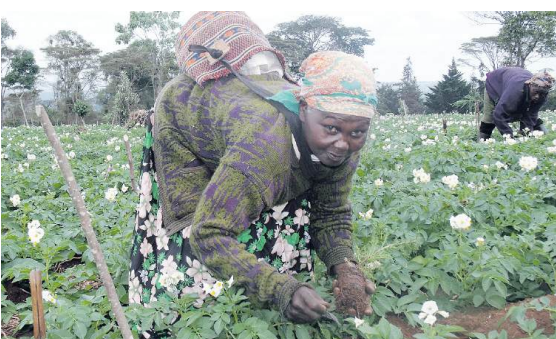

More than 150,000 smallholder potato farmers are set to be trained on climate-smart innovations and technologies to help them increase potato production for both domestic consumption and export.
The training will be done by the National Potato Council of Kenya in partnership with the Kenya Agricultural and Livestock Research Organisation and Egerton University.
NPCK Board chairman Prof John Ndiritu said the partnership is implementing a three-year project titled the ‘Kenya Sustainable Potato Initiative.’
“The initiative will help digitise the groups, provide them with farm inputs, give them access to markets and enable them to get fair prices for their produce.” he said.
The Sh195 million project’s main objective is to directly increase the productivity and earnings of the targeted 150,000 potato farmers.
This, while creating employment opportunities for more than 4,000 youth.
The project will also benefit another 300,000 farmers indirectly through value-chain addition.
Of the 150,000 farmers targeted, 40 per cent are expected to be women and another 10 per cent will represent the youth.
The initiative targets the four largest potato-producing counties in the country, namely Nyandarua, Meru, Laikipia and Nandi.
It intends to strengthen 400 potato farmer groups spread across the counties by providing them with structured marketing systems.
Ndiritu said they are equipping agricultural extension officers and other agricultural experts.
These will in turn train potato growers on modern farming practices that would mitigate against risks like drought, floods, climate-induced pests and diseases.
Lack of certified seeds and poor marketing strategies have continued to hamper the lucrative potato trade in the country.
Ndiritu said the main objective of the initiative is to increase seed production from the current 900 metric tonnes to up to three times the amount over the next three years.
He said scarcity of certified potato seeds in the country had stagnated production of the crop, which currently stands at seven tonnes per hectare against a potential of 40 tonnes per hectare.
Kenya’s potato seed demand is at 30,000 tonnes annually.
Nakuru, which is the second-largest producer of the crop in Kenya after Nyandarua, is now producing a mere 6,700 tonnes, with most farmers recycling crops from the previous season to use as seed.
Through the project, village-based advisers will be trained on climate-smart potato production technologies, innovation and management practices, and ways to reduce post-harvest losses by 50 per cent.
Farmers will be taught mechanised potato farming and sustainable agricultural practices, such as using green energy.
The NPCK intends to help build a strong and efficient potato seed production system that enhances farmers’ access to high-quality seed of appropriate varieties.
“We are also promoting inclusivity by ensuring equal opportunities to markets, trade opportunities and access to financial services for smallholder potato farmers,” Ndiritu said.
With aggressive farmer training on the importance of certified seeds, the demand for clean planting materials will drastically increase, he said.
Prof Antony Kibe, who leads Egerton University’s role in the KSPI project, said potato is the second-most consumed food in the country after maize, making it a key factor in the country’s diet and economy.
The crop is both a staple food and a cash crop, grown by more than 800,000 farmers across the country and employing more than two million people in the process, he said.
It contributes more than Sh50 billion to the country’s economy.
“Kenya is currently producing only nine tonnes of potatoes a year, in comparison with countries like Egypt, which produces up to 40 tonnes,” Kibe said.
"This is nowhere close to meeting the potato demand in the country.”
Kibe said Kenya has the potential to produce up to 30 tonnes of potato per year but is limited by various factors.
These include poor seed quality as only 5 per cent of farmers in Kenya have access to certified potato seeds.
Most farmers rely on the historical seeds, which have been recycled many times and have lost their potential.
Other factors include lack of access to farm inputs such as fertiliser, poor management of pests and diseases, climate change and lower prioritisation of the crop as compared to maize.
Kibe said they are using various forums, including farmers’ field days, to disseminate information to farmers to address climate change challenges.
The end goal is to translate the information, knowledge and new technologies into increased incomes for smallholder farmers and alleviate poverty.
Kibe said they are collaborating with research institutions in coming up with solutions that support potato smallholder farmers to tackle the risks they face.
These include pests, a decline in soil fertility and diseases that are rampant in the lucrative sector.
“We are promoting the adoption of practices and technologies that will support farmers to conduct potato farming in a climate-smart way by focusing on environmental conservation,” the professor added.
He said initiatives by the project to improve potato farming are addressing the entire chain.
This ranges from soil testing, soil management, quality seeds, best husbandry to marketing in addition to improved value addition, including starch and animal feed production.
Prof Kibe said the drive to bolster the potato sub sector includes making farming attractive to the youth through embracing modern farming technologies and addressing post-harvest losses.
“Potato is finally getting the recognition it deserves, emerging as a strategic crop with the potential to help meet some of the goals set in Vision 2030,” he said.
"The project’s goals are also aligned with the government’s bottom-up economic strategy, whereby it strives to raise the income level of small-scale farmers and create jobs for thousands of youths.
“KSPI will also provide our students with attachment and internship opportunities, where they can get first-hand experience in potato production and management.”
The KSPI project, which will end in June 2027, will integrate at least 190 students and youths into the value-chain process, in which they will gain experiential learning.
Despite being the most consumed staple food after maize in Kenya, potato farming is laden with challenges.
These include lack of certified seed, lack of training in good agricultural practices for optimal potato production, lack of access to modern technology and limited access to markets.
Potatoes are also Kenya’s second-most-produced crop after maize. On average, 1.35 million tonnes of potatoes are produced in Kenya annually.
Potato is grown by about 800,000 farmers spread across various counties.
A report by the Centre for Agriculture and Bioscience International found that over the years, potato yields have been declining.
In the last 10 years, the yield has hit a low of 12.4 tonnes per hectare, which is far below the global average of 21 tonnes per hectare.
“This has been attributed to several problems, with the most important being the high incidence of pests and diseases, some of which are seed- and soil-borne,” the report states.
The Food and Agriculture Organisation ranks Kenya at number 33 in potato production out of 155 potato-growing countries, but the country has recorded a steady decline over the years.
For example, in 2022, Kenya produced 1.7 million tonnes of potatoes against a worldwide production of 374 million.
Despite the global potato production rising by 0.3 per cent in 2022, Kenya’s output dropped from 2.1 million metric tonnes in 2021 to 1.7 million in 2022.
China leads global production (25 per cent), while in Africa, Algeria topped the list with a production of 4 million tonnes.
Belgium followed with 3.5 million tonnes, while South Africa was third with 2.5 million tonnes.

















